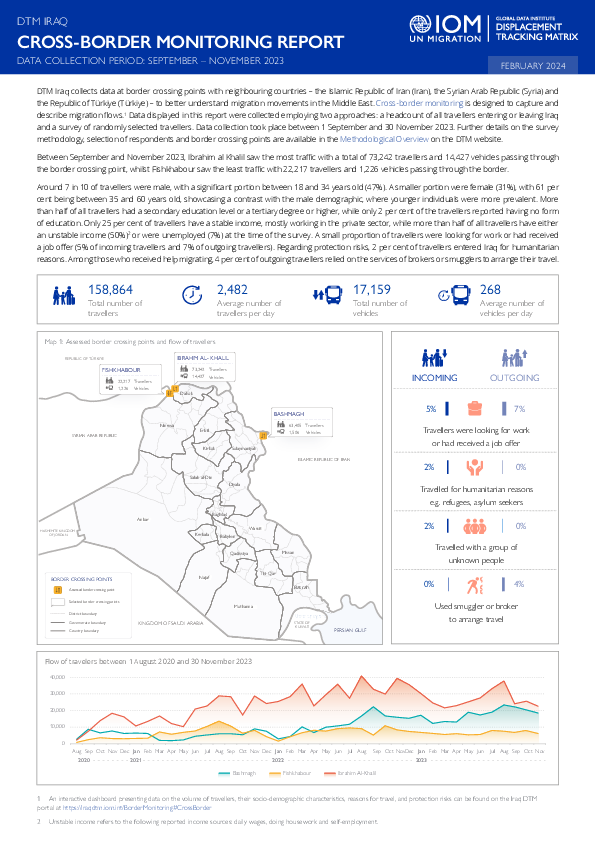-
Countries
-
Data and Analysis
-
Special Focus
-
Crisis Responses
Iraq – Cross-Border Monitoring (September – November 2023)

Contact
DTM Iraq, [email protected]
Language
English
Location
Iraq
Period Covered
Sep 01 2023
Nov 30 2023
Activity
- Survey
- Flow Monitoring Survey
- Flow Monitoring
DTM Iraq collects data at border crossing points with neighbouring countries – the Islamic Republic of Iran (Iran), the Syrian Arab Republic (Syria) and the Republic of Türkiye (Türkiye) – to better understand migration movements in the Middle East. Cross-border monitoring is designed to capture and describe migration flows.1 Data displayed in this report were collected employing two approaches: a headcount of all travellers entering or leaving Iraq and a survey of randomly selected travellers. Data collection took place between 1 September and 30 November 2023. Further details on the survey methodology, selection of respondents and border crossing points are available in the Methodological Overview on the DTM website.
Between September and November 2023, Ibrahim al Khalil saw the most traffic with a total of 73,242 travellers and 14,427 vehicles passing through the border crossing point, whilst Fishkhabour saw the least traffic with 22,217 travellers and 1,226 vehicles passing through the border.
Around 7 in 10 of travellers were male, with a significant portion between 18 and 34 years old (47%). A smaller portion were female (31%), with 61 per cent being between 35 and 60 years old, showcasing a contrast with the male demographic, where younger individuals were more prevalent. More than half of all travellers had a secondary education level or a tertiary degree or higher, while only 2 per cent of the travellers reported having no form of education. Only 25 per cent of travellers have a stable income, mostly working in the private sector, while more than half of all travellers have either an unstable income (50%)2 or were unemployed (7%) at the time of the survey. A small proportion of travellers were looking for work or had received a job offer (5% of incoming travellers and 7% of outgoing travellers). Regarding protection risks, 2 per cent of travellers entered Iraq for humanitarian reasons. Among those who received help migrating, 4 per cent of outgoing travellers relied on the services of brokers or smugglers to arrange their travel.